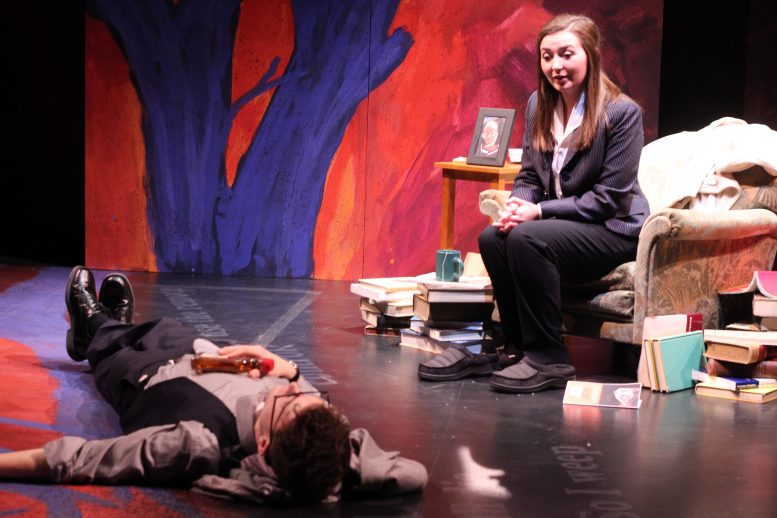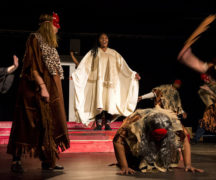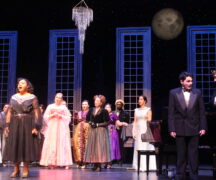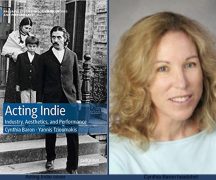By DAVID DUPONT
BG Independent News
The linguist at the center of the play “The Language Archive” is fluent in a number of languages. The language of the heart is not one of them.
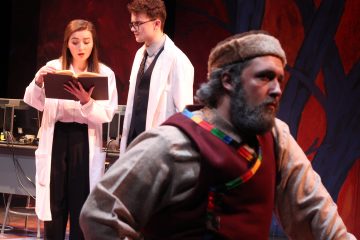
From left, Laura Hohman as Emma, Connor Long as George, and Michael Tosti as Resten in “The Language Archive.”
The play by Julia Cho is all about the difficulty of mastering that language. “The Language Archive” opens tonight (Thursday, Feb. 15) and continues weekends through Feb. 24 at the Eva Marie Saint Theatre in Bowling Green State University’s Wolfe Center for the Arts. Click for show times and ticket information.
For George (Connor Long) those troubles are evident from the opening scene. He’s concerned about his wife who always seems sad, crying at the least provocation whether watching TV, cleaning the house, or writing notes. “She uses her tears to seal the envelopes.”
But his wife, Mary (Felita Guyton), wonders why he never cries, not even at the death of his grandmother.
As a linguist devoted to preserving dying languages, he finds the extinction of a language far more moving than the death of any pet or family member. There are 6,900 languages in the world, he notes, and half of them are expected to be gone by the end of the century. The death of a language is the death of a world, he believes. (Though as another character points out later, the world dies first.)
George works in an archive of tapes of dead and dying languages. He and his long-time assistant Emma (Laura Beth Hohman) are welcoming a couple who speak a nearly extinct language. They hope to capture their conversation on tape. Usually they have only a single speaker of an endangered language who delivers long stories and monologues. Seldom do they have two people who can converse.
And Resten (Michael Tosti) and Alta (Hope Elizabeth Eller) do converse in a comic scene. They are sullen when they enter, and then they start talking, bickering. It starts with the wife’s complaints about getting stuck in the middle seat on the airplane on their flight over, devolves into his complaints about her cooking, and then they vow never to speak to each other again. All in English.
They explain to the linguists that when they argue they do so in English because their native tongue is too beautiful for arguments. It truly is the language of the heart. Now “Mr. Science Man,” as they call George, won’t hear those beautiful sounds because of their long simmering disagreements.
Emma has her own long-simmering feelings for George. His marital troubles give her hope. She is trying to learn Esperanto, a language developed by L.L. Zamenhof in the early 20th century as a logical, easy to learn international language. His goal was to promote world peace. George is a devotee.
Emma’s Esperanto teacher (Megan Kome) serves as much as a therapist as a teacher. Usually a person learns a new language because they are in love with a culture, or a person.
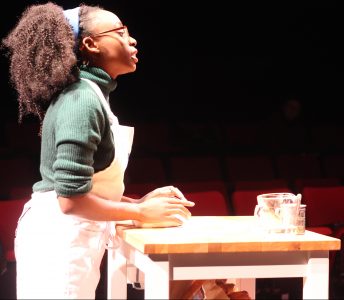
Felita Guyton as Mary
Cho leavens the drama with humor. Long, who has been a fixture on local stages from his Horizon Youth Theatre days, plays George as aloof, yet with a good heart if he cared to consult it. A blend of being at once lost in thought yet thoughtless, he hurts people through his obliviousness. Guyton’s Mary is conflicted about her feelings for George, yet she’s determined to find her own life. She’s just not sure where.
Hohman’s Emma is in a difficult situation. She’s in love, yet would never do anything to get between George and his wife. For her, Esperanto is the language that somehow gives her the words to resolve her difficulties.
Eller and Tosti have a good time with their roles, and share that with the audience. Their robust personalities and expression provides a contrast to the other characters’ more reserved personalities. When the plot demands, they pivot to express the deep feelings of a long married couple.
Isaac Batty plays several roles, each a guiding figure, including appearing to Emma in a dream as Zamenhof. Anna Hawersaat, as a train conductor, rounds out the cast.
Directed by Sara Lipinski Chambers and presented in the Eva Marie Theatre, the play has an intimacy that lets us get to know these characters. At the beginning of Act 2, George even gives the audience a short lesson in Esperanto. He runs through verb tenses for “I love.” His pronunciation is good, his comprehension is not.
The play eschews pat resolutions. It is romantic and comic, yet defies rom-com convention. “The Language Archive” proves to be a very fitting way to extend the Valentine’s holiday.

